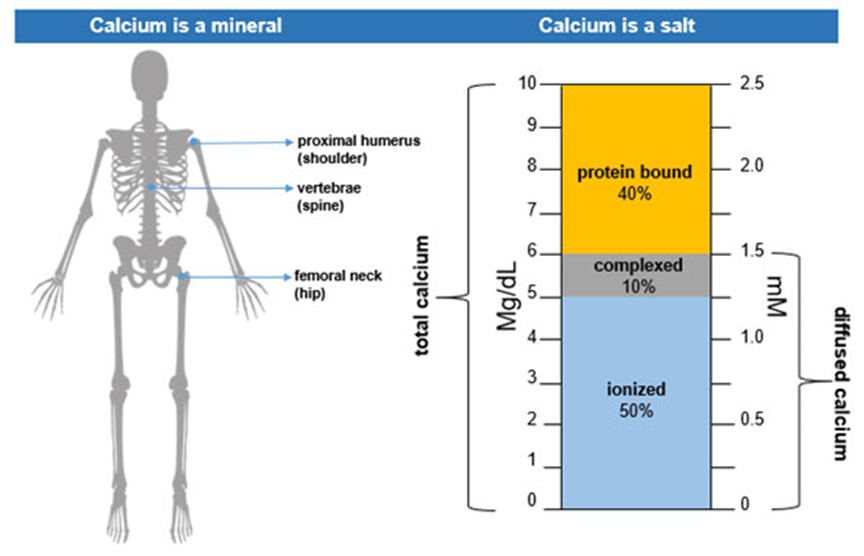What is the normal range of serum calcium in adults?
3.10 to 4.10 mg/dL
5.55 to 6.55 mg/dL
8.50 to 10.50 mg/dL
13.41 to 14.51 mg/dL
The Correct Answer is C
Choice A reason: This is a low value for serum calcium, which indicates hypocalcemia. Hypocalcemia can cause muscle spasms, tetany, seizures, and cardiac arrhythmias.
Choice B reason: This is also a low value for serum calcium, which indicates hypocalcemia. Hypocalcemia can cause muscle spasms, tetany, seizures, and cardiac arrhythmias.
Choice C reason: This is the normal range of serum calcium in adults. Calcium is essential for bone health, muscle contraction, nerve transmission, and blood clotting.
Choice D reason: This is a high value for serum calcium, which indicates hypercalcemia. Hypercalcemia can cause nausea, vomiting, constipation, confusion, lethargy, and kidney stones.

Nursing Test Bank
Naxlex Comprehensive Predictor Exams
Related Questions
Correct Answer is C
Explanation
Choice A reason: This is incorrect because intracellular fluid is greater than extracellular fluid in a hypertonic state, not an isotonic state. A hypertonic state is when the solute concentration of the extracellular fluid is higher than the intracellular fluid, which causes water to move out of the cells and shrink them.
Choice B reason: This is incorrect because extracellular fluid is less than intracellular fluid in a hypotonic state, not an isotonic state. A hypotonic state is when the solute concentration of the extracellular fluid is lower than the intracellular fluid, which causes water to move into the cells and swell them.
Choice C reason: This is correct because intracellular and extracellular fluid is equal in an isotonic state. An isotonic state is when the solute concentration of the extracellular fluid is the same as the intracellular fluid, which causes no net movement of water across the cell membrane.
Choice D reason: This is incorrect because interstitial fluid is less than the transcellular fluid in a situation of fluid imbalance, not an isotonic state. Interstitial fluid is the fluid that surrounds the cells, while transcellular fluid is the fluid that is contained in specialized cavities, such as cerebrospinal fluid, synovial fluid, or pleural fluid. The amount of transcellular fluid is normally very small compared to the interstitial fluid, but it can increase in certain conditions, such as edema, ascites, or hydrocephalus.
Correct Answer is D
Explanation
Choice A reason: This is incorrect because metabolic alkalosis is characterized by a high pH and a high HCO3-. The patient's pH and HCO3- are both low, indicating acidosis, not alkalosis.
Choice B reason: This is incorrect because respiratory alkalosis is characterized by a high pH and a low PaCO2. The patient's pH is low and PaCO2 is normal, indicating a metabolic problem, not a respiratory one.
Choice C reason: This is incorrect because respiratory acidosis is characterized by a low pH and a high PaCO2. The patient's pH is low, but PaCO2 is normal, indicating a metabolic problem, not a respiratory one.
Choice D reason: This is correct because metabolic acidosis is characterized by a low pH and a low HCO3-. The patient's pH and HCO3- are both low, indicating a metabolic disorder. The condition is uncompensated because the PaCO2 is normal, meaning the respiratory system is not compensating for the metabolic acidosis.
Whether you are a student looking to ace your exams or a practicing nurse seeking to enhance your expertise , our nursing education contents will empower you with the confidence and competence to make a difference in the lives of patients and become a respected leader in the healthcare field.
Visit Naxlex, invest in your future and unlock endless possibilities with our unparalleled nursing education contents today
Report Wrong Answer on the Current Question
Do you disagree with the answer? If yes, what is your expected answer? Explain.
Kindly be descriptive with the issue you are facing.
